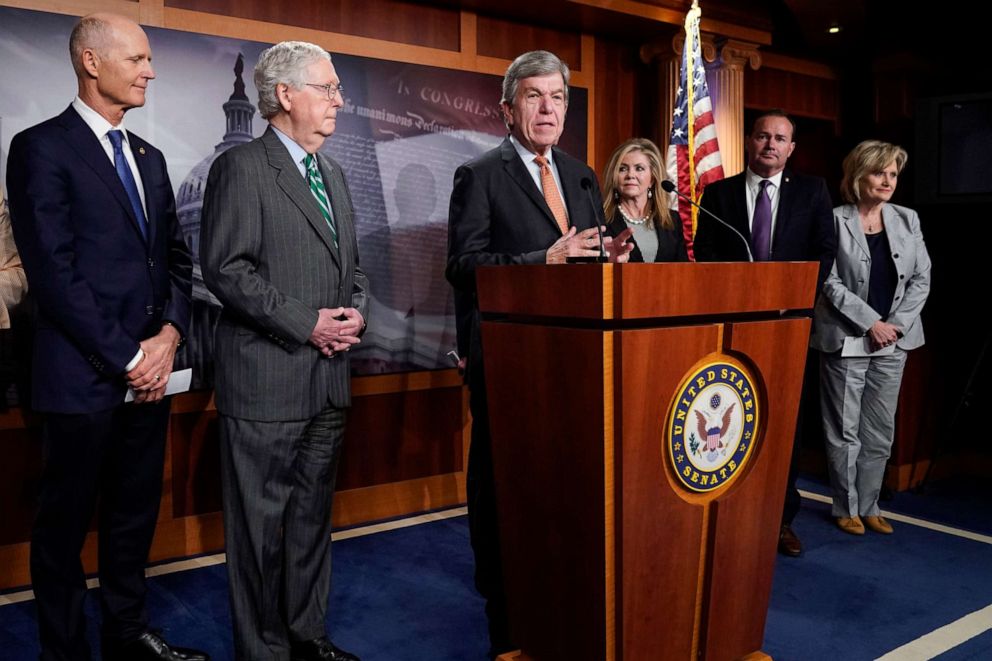Democrats push for party unity as GOP unites to block voting rights bill
Sen. Joe Manchin's list of modifications earned high-profile support Thursday.
Capitol Hill -- Senate Democrats scrambled on Thursday to unite behind a sweeping election reform bill ahead of a vote on the measure next week, with a key member of their caucus signaling a willingness to support them as Republicans present a united front in opposition.
"Our goal remains crystal clear: Protect the right to vote, strengthen our democracy, and put a stop to the tide of voter suppression flooding across our country," said Sen. Chuck Schumer, D-N.Y., who announced a Tuesday vote that would start debate on the bill titled the For the People Act.
"Republican state legislatures are conducting the most sweeping attack on the right to vote since the beginning of Jim Crow," Schumer said.

Fourteen states have passed restrictive voting laws this year and nearly 400 bills have been filed in 48 states, according to the Brennan Center for Justice, a nonpartisan law and policy institute.
The legislation is a sweeping election reform law that seeks to expand voter access to ballots through automatic registration, increased absentee ballots and early voting -- hallmarks of the pandemic -- as well as broaden campaign finance disclosures, limit partisan gerrymandering and institute federally-financed campaigns.
But Republicans say they intended to sink the measure that one GOP senator called "the mother of all power grabs."
"This is a solution in search of a problem," said Senate Majority Leader Mitch McConnell. "It's a massive takeover of our election system, and nobody is fooled, and next week the Senate will reject it."
"The Senate should reject this bill, and I believe the Senate will reject this bill," said Roy Blunt, R-Mo., a former Missouri secretary of state and top Republican on the Senate Rules Committee that oversees election law.
Republicans oppose any efforts to federalize elections and have claimed the bill would support "ballot harvesting," suppress First Amendment rights in campaign finance reforms and more broadly tilt future elections to Democrats with a partisan Federal Election Commission.
Despite the bill's expected failure on Tuesday, Democrats said caucus unity was an important symbolic pushback against red state election law changes that critics say depress turnout of voters who tend to support Democrats.
That unity became more likely this week when Sen. Joe Manchin, the only Democrat who has opposed the legislation, on Wednesday unveiled a list of modifications he said could earn his vote.
The Manchin list includes some items his party supports, like automatic voter registration and increased campaign finance disclosure. But his list also contains measures his colleagues have denounced in the past, like allowing modified voter roll purges and a voter ID requirement.
Still, the West Virginia Democrat received some crucial support Thursday. Fair Fight's Stacey Abrams signed on to the changes, something decried by McConnell, who announced his opposition to them.
"What Senator Manchin is putting forward are some basic building blocks that we need to ensure that democracy is accessible no matter your geography," Abrams told CNN's "New Day" adding, "Those provisions that he is setting forth are strong ones that will create a level playing field, will create standards that do not vary from state to state and I think will ensure that every American has improved access to the right to vote despite the onslaught of state legislations seeking to restrict access to the right to vote," Abrams said.
Sen. Raphael Warnock, D-Ga., who has been on the forefront of civil rights activism, struck a hopeful tone.
"I think that we are making considerable progress. We might squabble about one or two things," he said. "I’m not about to sacrifice the good in the pursuit of the perfect...I think we are very close to where we need to be."

The measure under consideration Tuesday would have to be amended to include Manchin's changes, and Manchin would not say how he intends to vote on the procedural measure. Still, his colleagues were convinced after a special closed-door lunch Thursday that Manchin was on board.
"I think we’re going to get there. I've always said there is 50 Democratic votes for a very good voting rights bill, and we’re taking the time to scale that. And again, if we did just what Joe (Manchin) provided, that would be a very robust voting rights bill," Sen. Tim Kaine, D-Va., told ABC News.
The Senate’s No. 2 Democrat, Dick Durbin of Illinois, noted the importance of a united Democratic front.
"What's going on across America, it can't be ignored. And even if the recorded vote does not come down in our favor -- I hope it does -- but if it doesn't, members need to be on the record. We are going through an era of voter suppression that is unparalleled in modern history and if Republicans want to be complicit that is their decision but they should be on the record," he said.
Despite that potential symbolic victory, Democrats are far from passing their legislation through the evenly-split Senate where 10 Republicans are required to join all of the majority party to break a GOP-led filibuster. It’s why voting rights activists have implored Democratic leadership to blow up the Senate’s filibuster rule, something Manchin, along with a number of other Democrats, have rejected.
But the vote Tuesday, with united GOP opposition, could lend fuel to the argument that the filibuster is outdated.
"I really wish the press would ask the other side more questions about voting rights, because it’s the voting rights that’s inscribed in the Constitution. Not the filibuster," said Warnock.
ABC News' Allison Pecorin contributed to this report.




